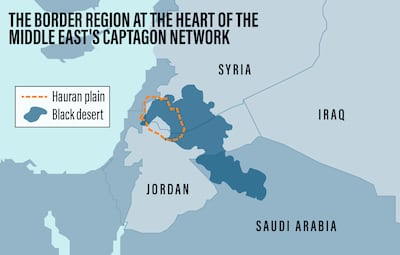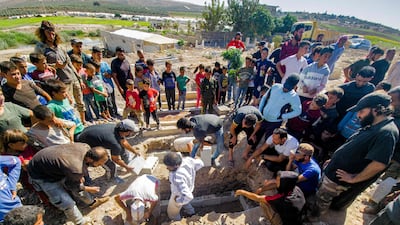Jordan hopes Russia will help maintain a "minimum stability" on its border with Syria, Jordanian Foreign Minister Ayman Al Safadi told Russian Foreign Minister Sergey Lavrov on Thursday as the kingdom struggles to curb the flow of narcotics from areas controlled by President Bashar Al Assad's forces.
Mr Al Safadi said after meeting Mr Lavrov that the two men discussed "the latent dangers of instability in southern Syria".
"There is the danger of the drug smuggling to Jordan and through it, and the militias who support this smuggling and other hostile acts," Mr Al Safadi said.
"We discussed the needed steps to neutralise this threat and provide the minimum level of stability".

The kingdom had hoped that the normalisation of relations with the Al Assad government, which was brokered by Russia last year, would halt the huge flow of drugs from regime areas of Syria, particularly stimulant pills known as Captagon.
Jordan has become the main transit route for narcotics into Saudi Arabia and other Gulf countries as Captagon production rose exponentially in Syria after the start of the war more than 10 years ago. Security officials in the region say it has become a major source of income for the regime in Damascus.
Mr Al Safadi described the Russian presence in southern Syria as "a factor for stability in these circumstances".
Mr Lavrov, who is due to meet King Abdullah on Thursday, said "more co-operation with Syria" was needed, without directly commenting on the drug issue.
Russian forces expanded their presence in southern Syria in 2018 after a deal between Moscow, Washington and Israel under which Syrian and other forces loyal to Mr Al Assad recaptured most of the area from rebel brigades.
The deal was supposed to guarantee border security for Israel and Jordan by keeping Hezbollah and other pro-Iran militias away from the frontier.
But Jordanian officials say militias supported by Iran encroached on the border and have been behind increased drug traffic, together with the Syrian military. This is despite the restoration of normal ties with Damascus in the last quarter of last year.
Jordan is closely allied with the United States and is a major recipient of US aid. But the kingdom supported the 2015 Russian intervention that tilted the conflict in favour of the Syrian regime and its Iran-backed militia allies.
The conflict started in 2011 with peaceful demonstrations against five decades of Assad family rule, before the revolt militarised by the end of the year, largely in response to the regime's violent suppression of the protest movement.
Jordan supported the revolt but withdrew its backing to rebel brigades, along with other Arab countries, after the Russian intervention in late 2015. King Abdullah has visited Moscow several times since then and strengthened security ties with Moscow, which became the interlocutor between Amman and Damascus.


